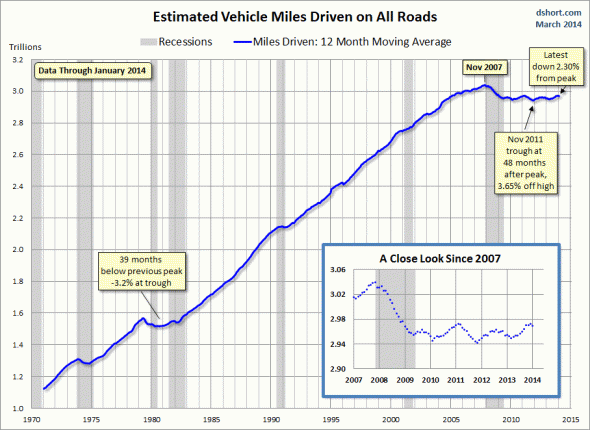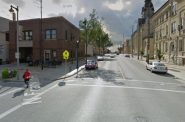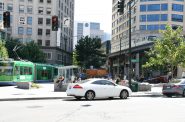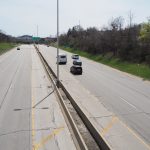More Transit Funding Needed, Fitch Ratings Warns
Economy could suffer if governments don't recognize decline in driving and other trends that favor transit.
One of the world’s leading financial analysts, Fitch Ratings, is warning that if America doesn’t change how it invests in transit, the whole economy could suffer.

After decades of steady growth, vehicle miles driven has stagnated in recent years. Americans are driving no more total miles now than in 2004. Image: Doug Short/Investing
“Public transportation investment strategies will need to transform if trends toward increased multifamily housing, declines in driving, and increasing public transportation usage continue over the long run,” Fitch said.
In an article published March 12, Fitch says there are signs of a major shakeup in U.S. transportation. The ratings group points to trends away from driving among millennials and an uptick in transit use. Fitch also cites record-breaking levels of multi-family housing construction, which represented almost one-third of new housing starts last year.
Fitch writes:
In our view, the transportation needs of the next 50 years will be markedly different from those of the past 50 years. U.S. policymakers must begin adapting their current decisions to these future needs. If these trends persist and meaningful policy changes are not made, the risk to the public transportation system would have negative implications for the entire economy.
That’s a strong warning from one of the big three global ratings agencies. It comes as Congress hems and haws about how to fund the next transportation bill, and transit agencies are just beginning to recover from the painful cuts they had to make during the recession, when demand skyrocketed and resources plummeted.
Saying, “the market has limited appetite for project risk when repayment is in question,” Fitch acknowledges the truth that roads don’t pay for themselves. While the group defends the need to support the interstate system by any means necessary, it admits that “in some cases stability will require the public subsidies that are common in many other developed countries.”
How Is Wisconsin Handling Transit?
Gov. Scott Walker campaigned on, and successfully killed an $800 million high speed rail connection, which would have linked Chicago to Madison, via Milwaukee, and one day could have connected to Minneapolis.
Walker’s 2011-13 budget included a cut to state transit aid of $9.6 million a year, which comes out to a $6.8 million a year cut for the Milwaukee County Transit System.
In this same budget the Kenosha-Racine-Milwaukee (KRM) commuter rail project was killed by Republican legislators with a budget item that dissolved the Southeastern Regional Transit Authority.
In the latest budget a motion pushed by Rep. Dale Kooyenga shifted the cost of utility relocation from the utilities that operate, essentially rent free, in the public right-of-way, to taxpayers of the City of Milwaukee for the streetcar project, thus overturning 100 years of precedent.
All of this comes at time when as Dave Schlabowske, the Bike Czar, reported: “According to Transportation in Transition, by U.S. Public Inerest Research Group, the Milwaukee and Madison urbanized areas saw the second and third largest drops in per-capita Vehicle Miles Traveled (VMT) in the nation: down 21 percent and 18 percent respectively.”
Story by Angie Schmitt with additional contributions from Urban Milwaukee. A version of this story originally ran on Streetsblog. Angie Schmitt is a newspaper reporter-turned planner/advocate who manages the Streetsblog Network from glamorous Cleveland, Ohio. She also writes about urban issues particular to the industrial Midwest at Rustwire.com.
Streetsblog
-
Car Culture Cements Suburban Politics
![Sprawl. Photo by David Shankbone (David Shankbone) [GFDL (http://www.gnu.org/copyleft/fdl.html) or CC-BY-SA-3.0 (http://creativecommons.org/licenses/by-sa/3.0/)], via Wikimedia Commons [ https://commons.wikimedia.org/wiki/File%3ASuburbia_by_David_Shankbone.jpg ]](https://urbanmilwaukee.com/wp-content/uploads/2017/10/1024px-Suburbia_by_David_Shankbone-185x122.jpg) Nov 23rd, 2018 by Angie Schmitt
Nov 23rd, 2018 by Angie Schmitt
-
Most Drivers Don’t Yield to Pedestrians
 Mar 22nd, 2018 by Angie Schmitt
Mar 22nd, 2018 by Angie Schmitt
-
Jobs Up Yet Driving Down in Seattle
 Feb 22nd, 2018 by Angie Schmitt
Feb 22nd, 2018 by Angie Schmitt

















Crickets from the right…
Crickets? They just posted the piece a few hours ago! First off, its pretty tough to draw any conclusions on this report when the article provides nearly nothing as far as even what reasons are given for coming to this big conclusion about the future of the American economy. All that I see is that an uptick in multi-family housing starts, less driving among millennials and that driving rates are hovering around 2004 levels. OK that’s great but what else did they take into consideration to come to this big conclusion? Who knows! As far as the multi-family housing, I’m in the real estate biz and constantly reading up an the various trends in the industry and that is true, but I wouldn’t count on it lasting too long. After the housing crash of 2008, several trends shifted quite a bit, including a major downturn in new housing starts and a small uptick in muti-family as the article mentions. New housing’s nosedive was due to several factors,but the drop in that sector means that the small uptick in multi-fam may look bigger than it really is, if you’re looking at a percentage portion of the overall market.
Look at what were doing here in the Milwaukee metro area with our public transit. Led by Mayor Barrett, many libs are all gung ho and feeling tingles in various places over the possibility of us soon having a shiny new streetcar running in circles through the downtown and 3rd Ward. They’re so excited about it, that even when someone figured out along the way that we’d have no choice but to have to relocate all sorts of utility lines under the streets where the trolley would run, with an estimated price tag of over $50 MILLION nearly doubling the cost of the project to over $100 MILLION, not a single, highly aroused lib even batted an eye! The public transit crazy libs have been foaming at the mouth for decades over their never ending wet dream of getting ANY sort of transit around here that doesn’t run on rubber tires, they could find some new hidden cost for the project that would double it again and they couldn’t care less, they want something, anything resembling a train and whatever the final total ends up being, they’ll tell you its worth it dammit!
Meanwhile, a recent and fairly well publicized report came out that simply told us something we already knew, that our current county transit system isn’t doing a damn thing for inner city residents whose only option is transit, as far as getting inner city residents out to the many suburban industrial parks in cities like New Berlin, Menomonee Falls, Germantown, etc where there always are multiple companies looking to hire both skilled and entry level employees. Now, of course this is when the transit crazies will try to say that the trolley funding (or at least the funding for the trolley, not moving the utilities) can’t be spent on expanding the buses because of strings attached by the feds who supplied it. You can’t tell me that if the city, county and state officials teamed up with bi-partisan support from maybe Gwen Moore and Paul Ryan that they wouldn’t be able to get whatever changes or waivers are needed to switch the funding to the bus system. Think of how far $100+MILLION could do for getting inner city residents out to those jobs. Yet, we don’t hear a peep from the sorry slate of officials that represent the inner city to the city, county and state because they’d never want to do a thing to cross their Democrat colleagues from other parts of the city and many of them are too busy with their main pursuit and the real reason why they got into inner city politics, which of course is always looking for new ways to line the pockets of friends, relatives and of course themselves!
@East Slider Just to be clear the $50 million utility cost is incorrect (and I would have sworn I’ve told you that before). That number was put out by the utilities prior to significant engineering being done, and as we’ve reported here it was overstated. For example, the AT&T cost which was originally stated as $10 million is actually $500k (note partial move off of Broadway). And to be clear the utility cost was always part of the project, the only thing that happened is that local control and 100 years of precedent was squashed when very late in the game (and after one very questionable PSC meeting) the state law was changed. Further, the concept that we as taxpayers have to pay the utilities to buy new gear because they get to operate on our pubic property for free is bizarre.
I love this false argument about moving the money. How about not borrowing Billions for not needed (note the Fitch report) freeway expansion and reverse the Walker transit cuts? Doing that would actually save money and could actually improve transit in throughout SE Wisconsin.
Under federal rules, operating and capital (construction) funds must not be intermingled. The feds (with rare exceptions) don’t provide any transit operating funds for big cities. Those exceptions (like the money funding the MCTS Red, Green, and Blue routes) are limited to just 2 or 3 years. For MCTS, that money expires in December.
There is simply no way under today’s federal rules (enacted by Republicans under Reagan to hurt transit) that any federal money could be used to operate any transit (buses, rails, whatever) on a continuing basis in a large city like Milwaukee. At best, federal money could be used to help buy new buses, but once purchased, there would be no money to operate them.
Who pays for utility relocation when needed for a road/highway project? Don’t they need to move some power lines as part of the Zoo Interchange reconstruction? I better not be paying for that via my We Energies bill or my tax dollars – for as often as I use the Zoo Interchange the current configuration is fine, just repair it as is.
I really enjoy politicians like Kooyenga – he’s perfectly willing to screw the City of Milwaukee any way he can in the name of saving money, but when the tables are turned (e.g., Zoo Interchange expansion and double-decking I-94 through the Veteran’s Cemetery) I haven’t heard a word about how wasteful that is.
@East Sider
The “getting inner city residents out to the suburbs” problem would not be relevant if Walker didn’t kill the Chicago, Milwaukee, Madison high speed rail line and the KRM commuter line to begin with. As a millennial, I understand the importance of public transit. It is cheap, I don’t have to pay gas, commutes are shorter, no traffic, no idiot drivers to deal with, I can work while commuting, etc. Also, a lot of us millennials have traveled the world while studying (almost 70% at my Alma Mater) and have seen what great public transit can do for a city.
Lyft is giving free rides for two weeks. http://get.lyft.com/pioneer/